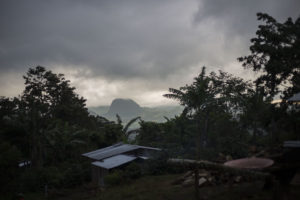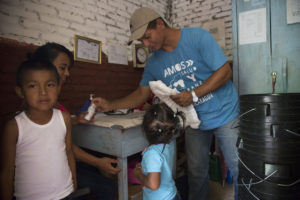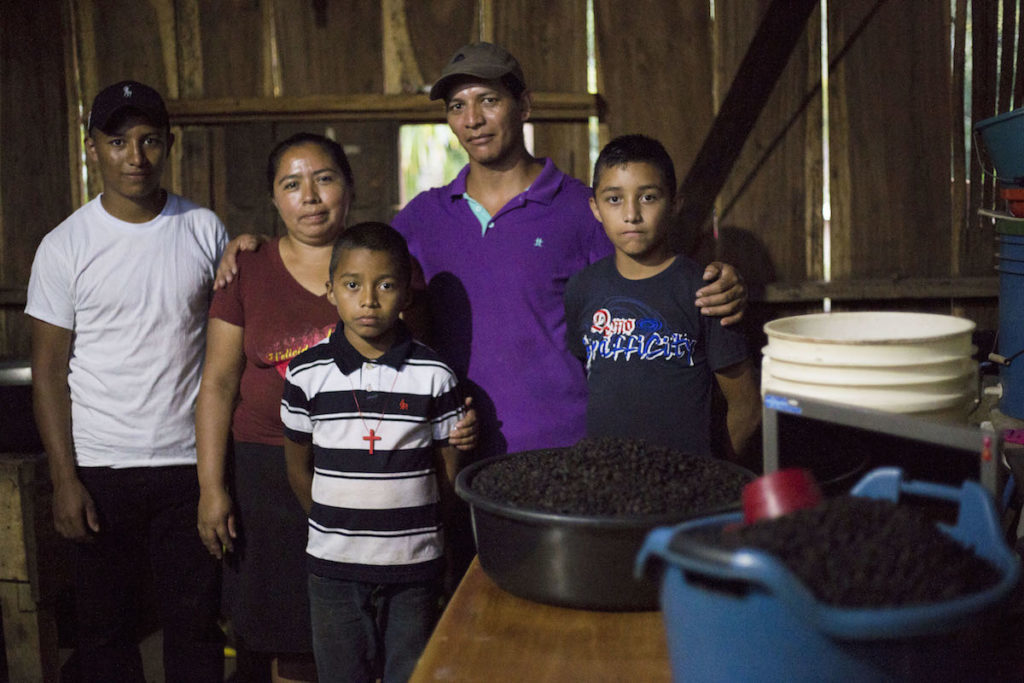Serving the Most Vulnerable
According to the World Health Organization, “complications during pregnancy and childbirth are the leading cause of death for 15 to 19 year-old girls globally.” AMOS’ commitment to the most vulnerable means that if a teen pregnancy does occur in one of the communities we serve, the health promoters we train and walk alongside know exactly what to do to prevent a possible tragedy and help improve the health of these young mothers. In a remote, rural Nicaraguan community, this is a process that includes accompaniment, planning, and quick thinking. Isaac Fley, health promoter of El Socorro, knows this well.
What Do You Do When Your Neighbor is in Pain, and Scared?
Isaac Fley is from the rural community of El Socorro in Matagalpa. It’s a remote community, 11 km away from the nearest health center. In Isaac’s community, there is limited access to healthcare, and this can be especially dangerous for pregnant women, who face various barriers to giving birth safely in a health facility many miles away.
This is why Isaac makes sure to visit his most vulnerable neighbors to share advice and provide basic healthcare, especially to the pregnant women in his community. Part of his work with pregnant women, like Sandra Francisca Diaz, a 16-year-old first-time mother, is making sure that they are able to leave the community to go to a health facility when it is time to give birth.

One day last November, Sandra had a prenatal check-up with a Ministry of Health doctor who offered her advice on her health. The doctor informed Isaac later that Sandra was in good health and had no problems with her pregnancy.
But a few days later, community members came to find Isaac at his house around 5:00 AM. Sandra was complaining of intense pain.
Isaac knew he needed to get to the bottom of the complaint – it can be a sign of danger when a pregnant woman has abdominal pain. So, he asked her to describe the pain, and she replied that it came and went, and that the stabs of pain were becoming more and more frequent, and lasting longer.
Isaac knew from his training that Sandra was entering into labor already! He had counseled Sandra on what contractions were, but because she was only 7 months pregnant, it had not occurred to her that she might be going into labor and that the pain could be contractions. But it was a surprise because Sandra had recently done an ultrasound, which confirmed that she was not due for at least another month.
When Community Organization Pays Off: The Transportation Committee
At first Sandra was scared, but they carried on: she was ready to fight for herself and the future of her baby. Once Isaac had identified the cause of the pain – they were birthing pains – he knew just what to do. The first step was to call the nearest hospital, in La Dalia, which was even further away than the nearest health center. He let the director know that they needed an ambulance to come as near to them as possible right away, because they had a member of the community in labor.
The furthest that the health center could send the ambulance was to a health post in a neighboring community, 9 miles away from El Socorro. So, they would all have to find a way to meet there.

Without a vehicle, walking or carrying Sandra 9 miles to the health post could have taken around two hours.
Luckily, El Socorro had organized as a community to be prepared for moments like this. There are three people in the community with vehicles, and El Socorro had organized a transportation committee to be able to utilize the community member’s resources in case of emergency.
At the time, two of the three community members with a car were outside of the community, but one person was present and willing to help! First, they had to take Sandra from her house to the main road.
Then, they had to take her from the main road one hour away on rough terrain to the health center.
Arriving Just in Time
They arrived at the health center almost at the exact same moment that the ambulance arrived! From there, they were able to take her in the ambulance from the health center to the hospital in the municipal center of La Dalia.
As they arrived they transported her to a stretcher, and as they entered the hospital in the stretcher, Sandra gave birth!
After giving birth she stayed in the hospital for three days, and Sandra and her baby are now back in the community, and both perfectly healthy.
“I think that what gives us strength, and motivates us to keep going with a desire to serve people, is seeing how grateful people are and hearing from people who give thanks for the work that we do,” Isaac told us.

“We Don’t Know What Would Have Happened Otherwise”
“When I think about this story, it causes me to reflect,” Isaac shared with us.
“This is something that inspires me, and motivates me, knowing that we were able to achieve saving a life, or even two lives. We don’t know what the outcome would have been with this girl otherwise. It’s possible that had we not taken action when we did, the outcome could have been fatal.”
The Ministry of Health doctor who had done a check up with Sandra a few days prior said he too was surprised that Sandra had give birth so soon, but confirmed that Isaac had done all the right things in responding to this unexpected situation. Isaac expressed that he was glad that he and his community were able to help, using all the knowledge they have gained in training over the years, strengthening their ability to identify problems and solve them.
Empowerment: “The Load is Lighter and We Are Stronger”
Isaac explained to us why empowerment is an essential part of community health in El Socorro. “The idea of empowerment is not to empower oneself, but also to empower others, so that everyone can help. It doesn’t do anything if you are the only one who is empowered, the the team you work with isn’t. The load would fall just to you. The load has to be shared, so that it is lighter. Work is done better in a team. So, if we are all empowered, and we are being empowered to serve, and empower other people, then the load is lighter and we are stronger. And that is what makes us successful.”

